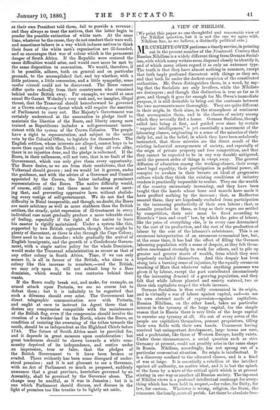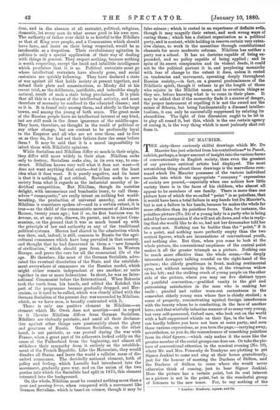A VIEW OF NIHILISM.
[We print this paper as one thoughtful and reasonable view of the Nihilist question, but it is not the one we agree with. Nihilism has, as we believe, a distinctly political side.]
NEB. CUNLIFFE OWEN performs a timely service, in pointing .1 out in the present number of the Nineteenth Century that Russian Nihilism is a widely different thing from German Social- ism' with which many writers seem disposed closely to identify it,
and of which many others regard it as only an extremer type. The truth is that they have almost nothing in common, except that both imply profound discontent with things as they are, and that both lie under the darkest suspicion of the constituted authorities. Mr. Owen distinguishes them, in a word, by say- ing that the Socialists are only levellers, while the Nihilists are destroyers ; and though this distinction is true so far as it goes, and though it goes far enough for Mr. Owen's immediate purpose, it is still desirable to bring out the contrasts between the two movements more thoroughly. They are quite different in their origin, in their aims, in the atmosphere of sentiment that accompanies them, and in the classes of society among which they severally find a home. German Socialism, though called into being at first, and guided ever since by certain "superior intelligences," is yet essentially a movement of the labouring classes, originating in a sense of the miseries of their daily lot, and in the belief, in which they have been sedulously instructed, that these miseries are the direct result of the existing industrial arrangements of society, and especially of the reign of private property and free competition, and that they cannot be expected to be in any way durably mitigated, until the present order of things is swept away. The general diffusion of education among the working-classes, their recog- nised legal equality, their participation in political power, all conspire to awaken in their breasts an ideal of progressive culture which they think the existing conditions of industry renders it practically impossible to realise. They see the wealth of the country enormously increasing, and they have been taught that the hands whose bone and muscle have made it have profited nothing by the increase ; that, as Rodbertus assured them, they are hopelessly excluded from participation in the increasing productivity of their own labour ; that, as Lassalle preached to them, so long as their wages are settled by competition, their rate must be fixed according to Ricardo's "iron and cruel" law, by which the price of labour, like the price of everything else, is in every case determined by the cost of its production, and the cost of the production of labour by the cost of the labourer's subsistence. This is an erroneous interpretation of an erroneous economical law, but, at the same time, it has had the effect of filling the German labouring population with a sense of despair, as they felt them- selves condemned eternally to work for others, and to pile up greater and greater stores of wealth, from which they were hopelessly excluded themselves. And this despair has been stung into a burning sense of injustice, by the equally erroneous teaching of Marx that whatever value anything possesses was given it by labour, except the part contributed unconsciously by the increasing demand of a growing population, and they felt that while labour planted and society watered, two or three rich capitalists reaped the whole increase.
German Socialism is thus really economical in its origin, and is virtually a war of labour against capital, and—to use its own abstract mode of expression—against capitalism. Russian Nihilism, on the other hand, takes no particular interest in the tyranny of the large capital, for the simple reason that in Russia there is very little of the large capital to exercise any tyranny at all. Six out of every seven of the people are capitalists themselves, peasant proprietors, tilling their own fields with their own hands. Commerce having received but unimportant development, large towns are rare, and a proletariat, like those of Western Europe, hardly exists. Under these circumstances, a social question such as stirs Germany at present, could not possibly arise in the same shape in Russia. Nihilism, accordingly, has not sprung out of a particular economical situation. Its origin is intellectual. It is a discovery confined to the educated classes, and is a kind of war at large. It is essentially a rebellion of the intellect against all authority, no matter what, and it is but the splash of the foam by a wave of the critical spirit which is at present stirring in one way or another all Russian society. The tap-root of Nihilist views is a profound intellectual contempt for every- thing which has been held in respect,—for ruler, for Deity, for law, for custom. Whatever is wrong, religion, the State, the commune, the family, must all perish. Let there be absolute free.. dom, and in the absence of all restraint, political, religious, domestic, let every man do what seems good in his own eyes. The authority of father over child is as hateful to the Nihilists as that of King over people, and a Communism which should have laws, and insist on their being respected, would be as Intolerable as a despotism. Their revolutionary agitation in politics is only a special application of their way of dealing with things in general. They respect nothing, because nothing is worth respecting, except the lucid and infallible intelligence which proclaims that it is so. Political restraints must go where intellectual restraints have already gone, and social restraints are quickly following. They have declared a state of war against all that holds society at present together, and defend their plots and assassinations, as Lasky did at his recent trial, as the deliberate, justifiable, and indeedthe simply natural, result of such a state being proclaimed. It is plain that all this is a disease of the intellectual activity, and must therefore of necessity be confined to the educated classes ; and so it is. It is found only among them, and chiefly in the large towns, and among the young of both sexes. The great mass of the Russian people have no intellectual interest of any kind, but are still sunk in the dense ignorance of the middle-ages. They have, therefore, no thought in the world of political or any other change, but are content to be profoundly loyal to the Emperor and all who are set over them, and to live on as they do, for had not their fathers done the same before them ? It may be said that it is a moral impossibility to infect them with Nihilistic opinions. While Socialism and Nihilism differ so much in their origin, they differ still more widely in their aims. Nihilism seeks only to destroy, Socialism seeks also, in its own way, to con- struct. Nihilism knows very well what it does not want—it does not want anything that exists—but it has not the least idea what it does want. It is purely negative, and its boast is that it is nothing, if not critical. Socialism seeks to save society from what it regards as the industrial anarchy of in- dividual competition. But Nihilism, though its societies delight, with unconscious and bombastic irony, to call them- selves " cosmopoetic," are really intent on nothing but world- breaking, the production of universal anarchy, and chaos. Nihilism is sometimes spoken of—and to a certain extent, it is true—as the child of the communistic movement of Alexander Herzen, twenty years ago ; but if so, its first business was to devour, or, at any rate, disown, its parent, and to reject Com- munism, on the ground that it was as much bound up with the principle of law and authority as any of the traditional political systems. Herzen had shared in the admiration which was then, and, indeed, is still, common in Russia for the agri- cultural communes which have long prevailed in that country, and thought that he had discovered in them a "new formula of civilisation," which should pass from Russia to Western Europe, and prove the cure for all the economical ills of the age. He therefore, like most of the German Socialists, advo- cated the eventual dissolution of the State, and the establish- ment everywhere of communes on the Russian model, which might either remain independent of one another, or unite together in one or more federations. In short, he was an Inter- national Communist before the International. When Bakunin took the torch from his hands, and edited the Kolokol, this part of the programme became gradually dropped, and Her- zenism, as it used to be called, which was closely allied with the German Socialism of the present day, was succeeded by Nihilism, which, as we have seen, is broadly contrasted with it.
There is only one positive element in Nihilism—an element which Mr. Owen does not mention—and in regard to it likewise Nihilism differs from German Socialism. Nihilists are violently patriotic, and amid all their declama- tion against other things rave passionately about the glory and greatness of Russia. German Socialism, on the other hand, is not patriotic, as was proved during the war with France, when a great part of its adherents looked coldly on the cause of the Fatherland from the beginning, and almost all withdrew their sympathy from it entirely on the establish- ment of the French Republic. Like the Herzenists, they would dissolve all States, and leave the world a cellular mass of dis- united communes. The decidedly national element, both of policy and feeling, which Lassalle had introduced into the movement, gradually gave way, and on the union of the two parties into which the Socialists had split in 1875, this element retreated into the background. On the whole, Nihilism must be counted nothing more than a poor and passing fever, when compared with a movement like German Socialism, which is based on science, though it may be false science ; which is rooted in an experience of definite evils, though it may magnify their extent, and seek wrong ways of curing them ; which has a distinct organisation as a political party, and is content, while holding in reserve certain very exten- sive claims, to work in the meantime through constitutional channels for more moderate reforms. Nihilism has neither a party nor a school. It has no doctrine capable of being ex- pounded, and no policy capable of being applied ; and in spite of its secret conspiracies and its violent deeds, it could not be the political portent it is, and perplexing monarchs with fear of change to the extent it does, unless it rested on tendencies and movement, operating deeply throughout Russian society,—in fact, on a general predominance of the Nihilistic spirit, though it refuses to go the length of those who rejoice in the Nihilist name, and to overturn things as they are, before knowing what is to come in their place. It may be added that if the monarchy finds it a source of danger, the proper instrument of repelling it is not the sword nor the mines of Siberia, but being fundamentally a diseased intellec- tualism, it can only be successful1i7 suppressed by refuting its absurdities. The light of free discussion ought to be let in to play all round it, but this, which is the one certain agency of curing it, is the very thing which is most jealously shut out from it.



































 Previous page
Previous page